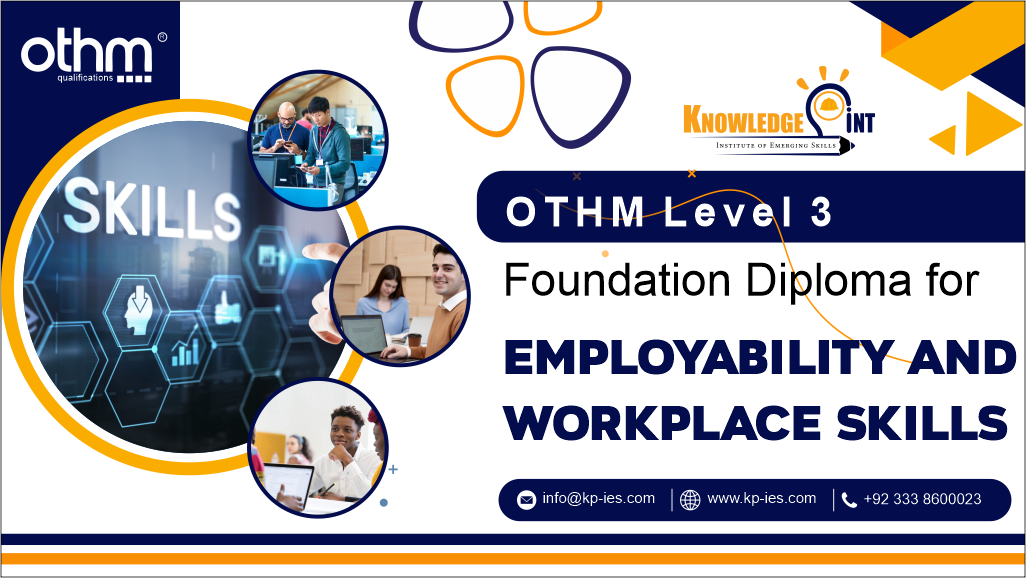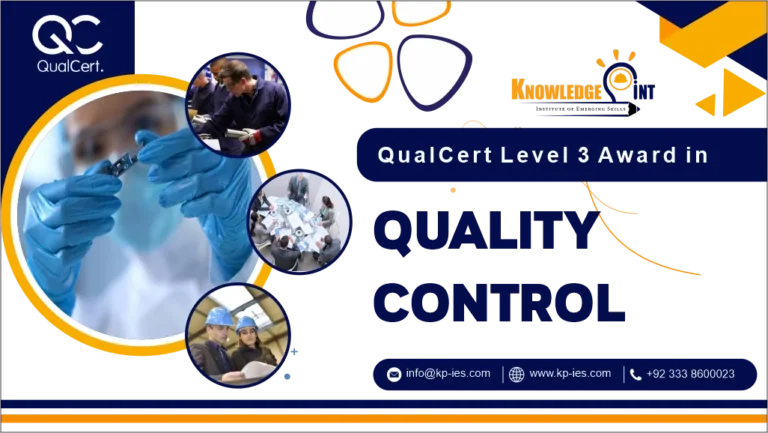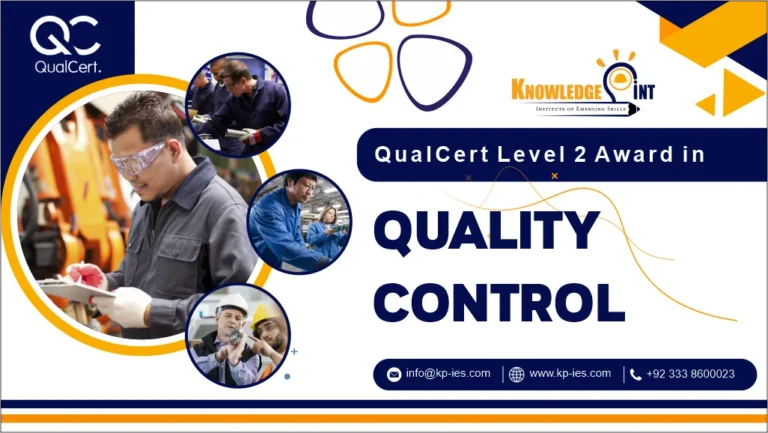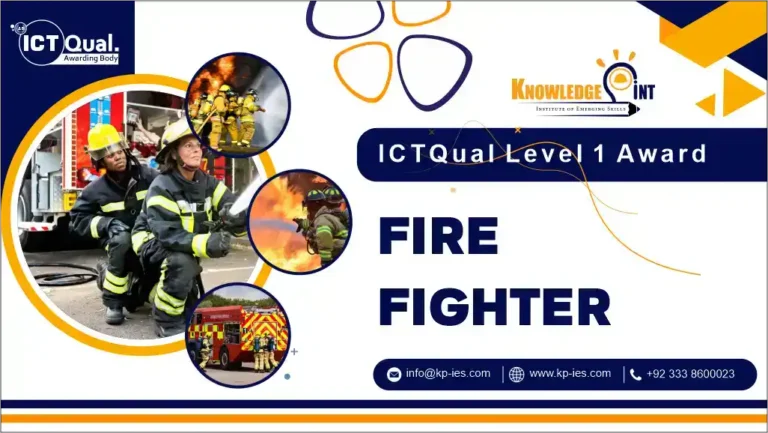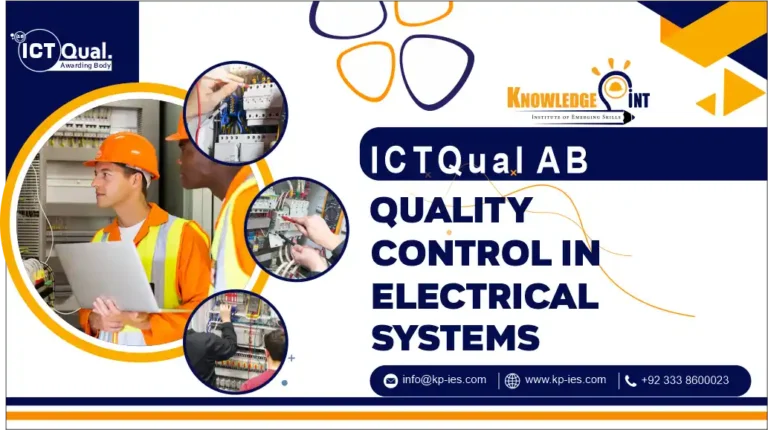In today’s competitive job market, having the right skills and qualifications is crucial for securing and excelling in employment opportunities. The OTHM Level 3 Foundation Diploma in Employability and Workplace Skills is designed to equip individuals with the essential skills and knowledge needed to thrive in various workplace environments. This comprehensive course not only prepares students for employment but also lays a strong foundation for further education and career advancement.
The OTHM Level 3 Foundation Diploma in Employability and Workplace Skills is a comprehensive qualification aimed at preparing individuals for the workforce. It covers a broad range of topics that are essential for personal and professional development, ensuring that learners are well-equipped to meet the demands of today’s dynamic work environments.
The OTHM Level 3 Foundation Diploma in Employability and Workplace Skills is a valuable qualification for anyone looking to enhance their employability and workplace effectiveness. By providing a solid foundation in essential skills, this diploma prepares learners to meet the challenges of today’s job market and succeed in their chosen careers. Whether you are just starting your career journey, looking to change careers, or aiming to advance in your current role, this diploma offers the tools and knowledge you need to achieve your goals. Invest in your future and take the first step towards a successful career with the OTHM Level 3 Foundation Diploma in Employability and Workplace Skills.
Course Overview
The OTHM Level 3 Foundation Diploma in Employability and Workplace Skills consists of 6 mandatory units which are as follows.
The OTHM Level 3 Foundation Diploma in Employability and Workplace Skills is designed to equip students with the essential skills and knowledge required for successful academic progression. Here are the key learning outcomes for each module:
Career Planning and Development
- Self-Assessment: Understand and conduct self-assessments to identify personal strengths, weaknesses, interests, and values related to career choices.
- Career Research: Gain skills in researching various career options, including understanding job roles, required qualifications, and industry trends.
- Goal Setting: Develop the ability to set short-term and long-term career goals, creating actionable plans to achieve them.
- CV and Cover Letter Writing: Learn to create effective CVs and cover letters tailored to specific job applications.
- Interview Skills: Acquire techniques for successful job interviews, including preparation, answering questions effectively, and professional presentation.
Managing Own Performance
- Goal Setting and Prioritization: Learn to set realistic and measurable personal performance goals, and prioritize tasks to achieve them efficiently.
- Time Management: Develop effective time management strategies to optimize productivity and meet deadlines.
- Self-Motivation: Understand techniques for self-motivation and maintaining a positive attitude towards work tasks.
- Performance Evaluation: Gain skills in self-evaluation and reflection to identify areas for improvement and celebrate achievements.
- Continuous Improvement: Implement continuous improvement practices to enhance performance and productivity.
Personal and Professional Development
- Skill Development: Identify and develop key skills necessary for personal and professional growth, such as communication, leadership, and problem-solving.
- Learning Strategies: Understand different learning styles and strategies to maximize personal and professional development.
- Professional Networking: Learn to build and maintain professional relationships and networks to support career development.
- Ethical Practices: Understand the importance of ethics and integrity in personal and professional settings, and how to apply them in practice.
- Lifelong Learning: Embrace the concept of lifelong learning and the importance of ongoing education and professional development.
Employment Skills
- Job Search Techniques: Gain proficiency in various job search methods, including online job boards, networking, and using recruitment agencies.
- Application Processes: Understand the procedures and best practices for applying to jobs, including tailoring applications and following up.
- Workplace Etiquette: Learn about workplace norms and etiquette, including professional behavior, dress code, and effective communication.
- Adaptability and Flexibility: Develop skills to adapt to different job roles, work environments, and changing job market conditions.
- Conflict Resolution: Understand conflict resolution techniques to handle workplace disputes effectively and professionally.
Working in a Business Environment
- Business Communication: Master effective communication skills for business settings, including email etiquette, report writing, and presentation skills.
- Teamwork: Understand the dynamics of working in teams, including roles, responsibilities, and collaborative problem-solving.
- Business Ethics: Learn about ethical issues in business and the importance of ethical behavior and decision-making.
- Customer Service: Gain skills in providing excellent customer service, including handling complaints and understanding customer needs.
- Organizational Structure: Understand different types of organizational structures and how they affect roles, responsibilities, and workflow.
Managing Resources
- Resource Planning: Learn to plan and allocate resources effectively to meet project and organizational goals.
- Budgeting: Understand the basics of budgeting, including creating, managing, and monitoring budgets.
- Time Management: Develop skills in managing time as a valuable resource, prioritizing tasks, and scheduling effectively.
- Technology Utilization: Gain proficiency in using technology to manage resources, including software tools for project management and resource allocation.
- Sustainability Practices: Understand the importance of sustainability in resource management and how to implement sustainable practices in the workplace.
These learning outcomes ensure that students completing the OTHM Level 3 Foundation Diploma in Employability and Workplace Skills are well-prepared to navigate their career paths, enhance their performance, and contribute effectively in various professional settings.
Course Benefits of the OTHM Level 3 Foundation Diploma in Employability and Workplace Skills :
1. Specialized Expertise
- Auditing Proficiency: Gain specialized knowledge and skills in auditing energy management systems according to the ISO 50001:2018 standard.
- Industry Recognition: Earn a globally recognized qualification that demonstrates your proficiency as an energy management systems auditor.
2. Career Advancement
- Expanded Career Opportunities: Qualify for roles such as Lead Energy Auditor, Energy Management Consultant, or Compliance Officer.
- Higher Earning Potential: Enhance your value to employers and increase your earning potential with specialized expertise in energy management auditing.
3. Industry-Relevant Skills
- Practical Application: Acquire practical skills and techniques for planning, conducting, and documenting energy management system audits.
- Effective Communication: Develop communication skills to interact with auditees, audit teams, and stakeholders effectively.
4. Contribution to Sustainability
- Promotion of Energy Efficiency: Play a key role in promoting energy efficiency and reducing environmental impact within organizations.
- Support for Sustainable Practices: Assist organizations in implementing and maintaining energy management systems that support sustainability goals.
5. Quality Assurance
- Compliance Assurance: Help organizations achieve compliance with ISO 50001:2018 requirements and other relevant regulatory standards.
- Risk Mitigation: Identify areas of non-conformance and provide recommendations for corrective actions to mitigate risks.
6. Continuous Professional Development
- Lifelong Learning: Engage in continuous professional development by staying updated with the latest developments and trends in energy management auditing.
- Networking Opportunities: Connect with industry professionals, auditors, and experts, expanding your professional network and opportunities.
7. Organizational Benefits
- Improved Performance: Contribute to the improvement of organizational energy performance through effective auditing and recommendations for continuous improvement.
- Enhanced Reputation: Help organizations build a positive reputation for their commitment to energy management and sustainability practices.
8. Personal Growth
- Leadership Development: Develop leadership skills to effectively manage audit teams, delegate tasks, and ensure audit objectives are met.
- Confidence Boost: Gain confidence in your abilities as an energy management systems auditor through practical training and hands-on experience.
The OTHM Level 3 Foundation Diploma in Employability and Workplace Skills serves as a robust starting point for individuals aiming to enhance their employability and workplace effectiveness. This diploma not only provides essential skills and knowledge but also opens up various pathways for further education and career advancement.
1. Further Education and Higher Qualifications
Level 4 and Level 5 Diplomas:
- OTHM Level 4 Diploma in Business Management: This course builds on foundational workplace skills with more specialized business management knowledge, preparing students for leadership and administrative roles.
- OTHM Level 5 Diploma in Management: Continuation from Level 4, this diploma delves deeper into management principles, equipping students with the expertise needed for higher-level management positions.
Higher Education Degrees:
- Bachelor’s Degree in Business Administration: This degree covers a wide range of business disciplines, providing comprehensive knowledge and skills for various business-related careers.
- Bachelor’s Degree in Human Resource Management: Focuses on the strategic and operational aspects of managing people in organizations, ideal for careers in HR.
- Bachelor’s Degree in Management Studies: Provides insights into management theories and practices, preparing students for leadership roles in various industries.
Associate Degrees and Diplomas:
- Higher National Certificates (HNC) and Diplomas (HND): These qualifications offer practical and theoretical training in specific areas such as business, administration, and management, serving as a bridge to undergraduate degrees or advanced professional roles.
2. Professional Certifications
Project Management Certifications:
- PRINCE2 Foundation and Practitioner: These certifications are widely recognized and valuable for roles involving project planning and management.
- Project Management Professional (PMP): This certification is ideal for individuals aiming to manage larger and more complex projects.
Human Resources Certifications:
- Chartered Institute of Personnel and Development (CIPD): Certifications from CIPD are beneficial for those pursuing a career in HR, providing recognition and validation of HR skills and knowledge.
IT and Digital Skills Certifications:
- Microsoft Office Specialist (MOS): Demonstrates proficiency in Microsoft Office applications, a valuable skill for many administrative and business roles.
- Digital Marketing Certifications: Certifications such as Google Analytics, Google Ads, and social media marketing courses can enhance employability in marketing roles.
3. Career Advancement Opportunities
Entry-Level Roles:
- Administrative Assistant: Utilize organizational and communication skills in various administrative tasks.
- Customer Service Representative: Apply interpersonal and problem-solving skills to assist and support customers.
- Sales Assistant: Use communication and sales techniques to promote products and services.
Mid-Level Roles:
- Team Leader: Oversee a team, ensuring effective collaboration and achieving targets.
- HR Assistant: Support HR functions such as recruitment, employee relations, and training.
- Office Manager: Manage office operations, ensuring efficient administrative processes.
Specialized Roles:
- Project Coordinator: Assist in planning, executing, and closing projects, applying project management skills.
- Marketing Executive: Implement marketing strategies, manage campaigns, and analyze performance.
- Business Analyst: Analyze business processes, identify improvement opportunities, and support decision-making.
4. Continuous Learning and Professional Growth
Workshops and Seminars:
- Attending industry-specific workshops and seminars helps professionals stay updated on the latest trends, best practices, and technologies.
Networking and Professional Associations:
- Joining professional associations, such as the Chartered Management Institute (CMI) or the Association of Business Executives (ABE), offers networking opportunities and access to resources for professional development.
Online Courses and MOOCs:
- Engaging in online courses and massive open online courses (MOOCs) allows continuous learning in specific areas of interest, such as leadership, digital skills, or specialized business functions.
The OTHM Level 3 Foundation Diploma in Employability and Workplace Skills is a valuable qualification that provides a strong foundation for various academic and career pathways. By pursuing further education, obtaining professional certifications, and gaining practical experience, graduates can significantly enhance their employability and career prospects. Whether aiming to specialize in a particular area, take on leadership roles, or continue their studies, this diploma offers numerous opportunities for future progression and professional success. Invest in your future today and pave the way for a rewarding and impactful career with the OTHM Level 3 Foundation Diploma in Employability and Workplace Skills.

